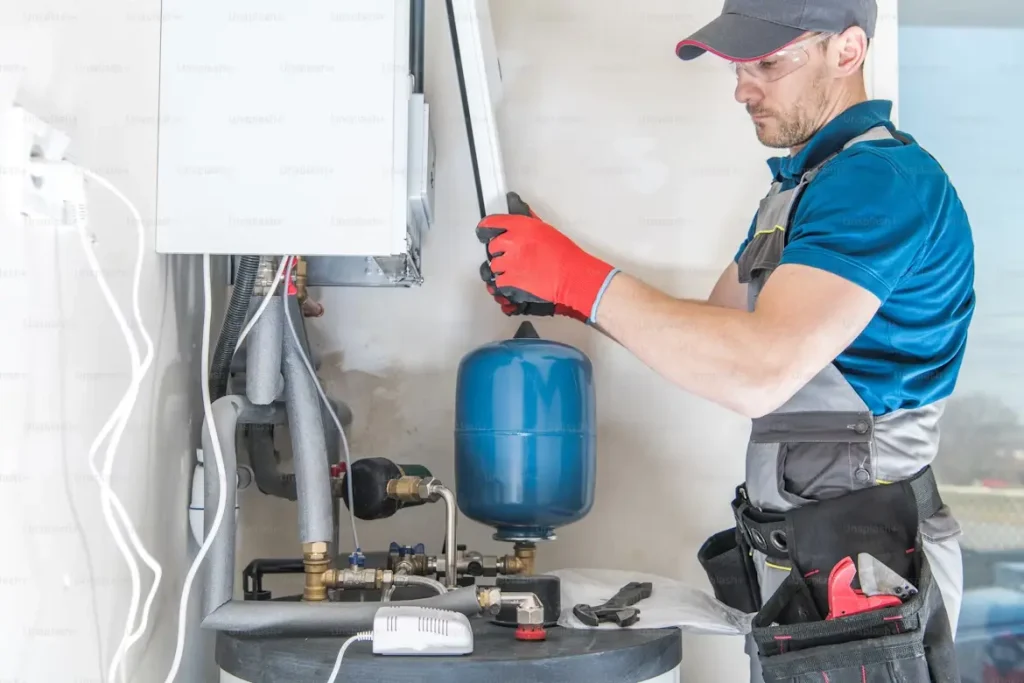

A gas leak from the stove? That’s not a recipe for a good meat pie. That’s a recipe for disaster!
Most homeowners, though, don’t know how to tell if a gas stove is leaking. They think everything is fine and dandy, and boom, fire or explosion goes out!
Let us walk you through the A to Z so that this type of problem never sets foot in your life. To be honest, there’s no room for a gas leak inside any kitchen!
Here’s a fun metaphor: a stove gas leak is easy to spot. The signs are obvious, unlike money that mysteriously vanishes right after a payday. The following are some signs to look for:
The flame on your gas stove should fire its usual blue hue. If it turns yellow, it’s a sign that something is abnormal. A yellow flame means the gas isn’t burning effectively.
Not only does it waste energy, but it also continuously produces carbon monoxide that can quietly poison yourself, your partner, your kids, and your pets. If you notice this, call a professional gas leak detection service.
Do you smell a rotten egg? It might not be because your eggs are actually rotten. It might be a gas smell!
Naturally, a gas on its own is odorless, and that’s why gas leaks from the stove are hard to detect by smell only. Thankfully, utility companies add a chemical called mercaptan so that you can sense any fishy odor right away.
If an oven door feels unusually hot, even after putting on your mitts, there might be a problem with the sealing or a gas leak waiting to explode.
At a normal state, remember, the door should stay warm but not scorching.
Modern ovens come with natural insulation that is meant to trap heat inside. If the insulation doesn’t work anymore, fumes are escaping. This is a sign for you not only to escape, but also to run to your nearest licensed gas fitter.
Don’t panic. As we all know, it doesn’t solve anything – not even stopping a possum from entering your backyard. So instead, here are the right courses of action:
You might have gone down the YouTube rabbit hole of fixing gas leaks and come out feeling like you’ve earned a bachelor’s degree in the respective field in under an hour.
But gas leaks aren’t the kind of problem you can DIY your way out of. Unlike fixing a squeaky door or patching a wall, dealing with gas requires licensed expertise, proper tools, and strict safety standards.

A licensed plumber knows how to test for leaks properly, repair them to code, and make sure your system is safe to use again.
You can count on Melbourne Gas Plumber, who regularly services areas from Dandenong to nearby suburbs, bringing peace of mind that a tutorial video just can’t provide.
Here are some mistakes you’d want to avoid to prevent your gas from ever leaking:
Prevention is best when you try to avoid a problem before it occurs. Most homeowners, though, only check their gas leak when a professional is coming for an inspection.
A cheat sheet that most people go by is the soapy water test. Apply a soapy water solution to gas lines and connections. If there’s a bubble, there might be a leak.
It’s your sign to evacuate the area, ventilate it, and refrain from using any electrical appliances until an emergency service or a gas utility company arrives.
Most importantly, maintenance goes a long way. Heat, grease, and age cause wear and tear. Include routine checks in your gas stove maintenance schedule to re-tighten any loosening equipment.
Cleaning daily, weekly, monthly, or quarterly also helps get rid of spots, rust, discoloration, and unpleasant odor. When your kitchen stays visible and intact, it also prevents any hidden damage.
FAQ about Gas Leak from Stove
By now, you understand how to tell if your gas stove is leaking. But if you still have any other questions, check out the answers below.
Wear your mask and immediately turn off the stove. Quickly ventilate the area afterwards by opening all windows and doors, and bring your loved ones outside.
Ensure there are no signs of fire hazards, especially near the stove. Wait until the smoke is completely out before safely stepping in.
Otherwise, call an emergency service. Prevent this issue from happening by installing a smoke detector, investing in a stove that automatically turns off after dormancy, or using a timer when cooking.
While a stove at times can emit some sort of odor (especially when you first light the burner), generally, it is not a good sign.
Even a faint smell could indicate a leak that requires immediate attention.
A strong, continuous, or persistent smell is an even bigger red flag, so turn off all your electronics and head outside. Most importantly, don’t try to fix the issue yourself – let the professionals handle it.
It depends on the severity of the leak and the quality of your home’s ventilation. But overall, after a leak, ventilate for at least 15 minutes to a few hours. Ideally, you should not come in until a gas company arrives and confirms that it is safe to do so.
Yes, and the warning signs are as clear as day. Signs to look for include rotten smell, yellow gas, dying house plants, and hissing sounds.
If you feel symptoms like dizziness, nausea, and shortness of breath, especially after walking near or using a gas stove, there might be an underlying problem. Do not wait until the gas explodes – act now.
Exposure can become deadly in 1-2 hours, and in more extreme cases (like inside an area without ventilation), the timespan shortens to less than an hour.
You can prevent this from happening in the first place by ensuring that your gas regulator functions normally. A broken system can cause incomplete combustion, which translates to more CO production.
How can you tell if you have a gas leak from your stove? Well, you don’t need to wait for the universe to drop a sign, because a good look at your stove will reveal the clues.
Never underestimate yellow plants, dying plants, or hissing sounds. They might be small, but if you leave them be, your gas stove might explode.
Check if your gas system is working safely by calling Melbourne Gas Plumber!


Fill the form below and we’ll get back ASAP!

MGP! Thank you for help, honest pricing and high quality work. Thank you to Joe for pricing and the boys involved for replacing my hot water tank and fixing my gas leak for a reasonable price. 5 star response, 5 star service and 5 star price.
Joe was great. Very professional and quick. Gas hot water heater needed replacing, he was honest and upfront about what our options were. System was sourced and replaced within a couple of hours.
Fantastic service very responsive Joe is highly recommended and works very clean and neat..... good job well done....very happy... will use again and again

At Melbourne Gas Plumber, we're here to handle all your gas plumbing needs throughout Melbourne. With over 40 years of experience, we bring extensive local knowledge and expertise to every job.
QUICK LINKS
OPENING HOURS
Open 24/7
